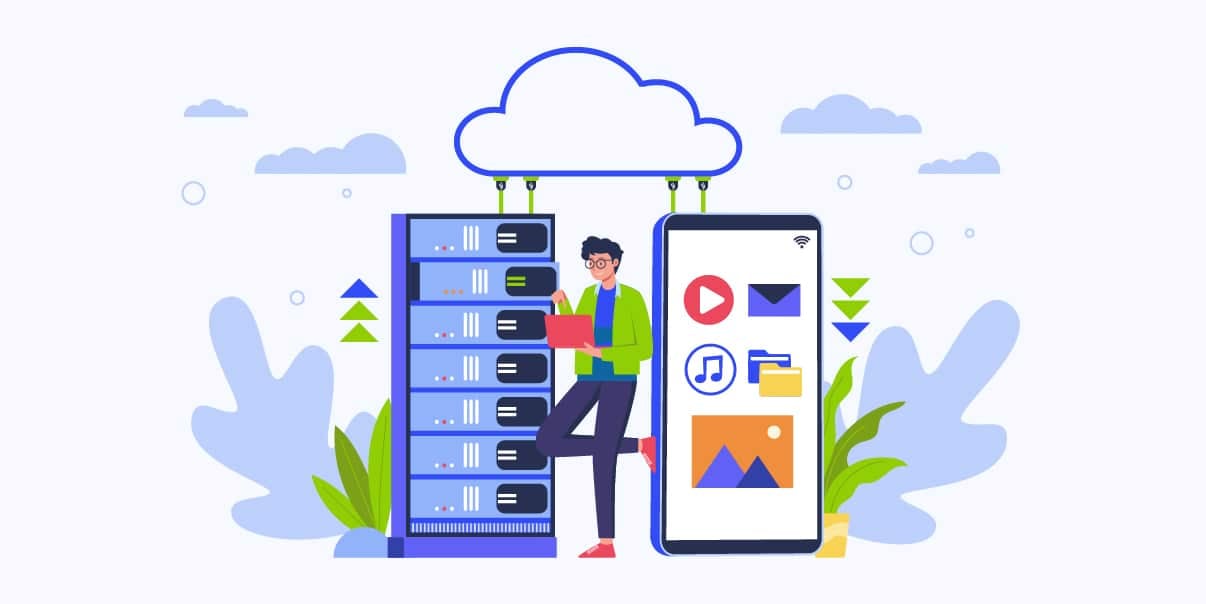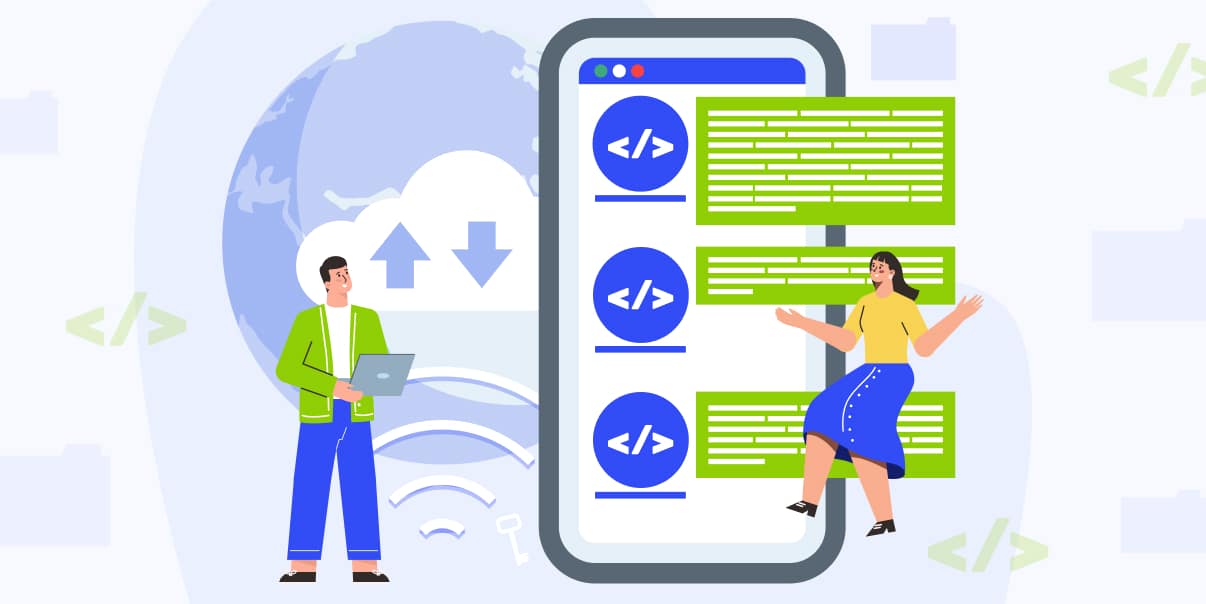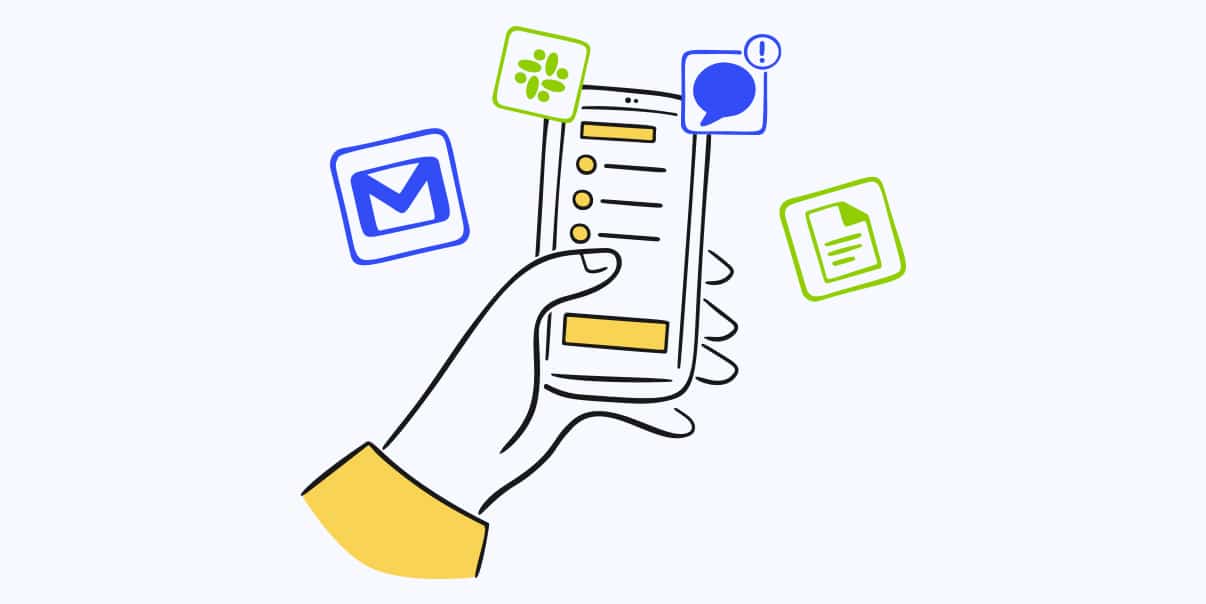Exploring Mobile Cloud Computing for App Development

Mobile cloud computing (MCC) is a revolutionary technology that’s changed how we use and develop applications. With cloud computing, you can create apps accessible from any device with an internet connection.
This article will discuss the advantages of cloud computing for app development and deployment. We’ll also list its limitations and potential future uses.
Overview of Cloud Computing and Mobile Applications
Mobile cloud computing is a technology that helps us access robust data and mobile apps when we’re not near a computer. It connects our phones to servers in the cloud, which means we can get what we need no matter where we are or what device we’re using.
Centralized cloud-based resources are accessed over a wireless connection on a mobile device. They allow developers to create, deploy and maintain applications quickly and efficiently. These cloud resources include:
- Distant immobile clouds
- Proximate immobile computing entities
- Proximate mobile computing entities
- Hybrid
Cloud computing and mobile technology make it easier for businesses to respond quickly to customers. These solutions let them stay ahead of their competition. It allows them to store data safely in the cloud and access it from anywhere, so they can quickly adapt to changing market conditions.
Here are some of the most popular mobile applications that leverage cloud computing:
- Dropbox
- Google Drive
- Microsoft Office 365
- Slack
- Salesforce
Benefits of Mobile Cloud Computing for Apps
MCC has transformed mobile cloud applications for the better. Developers can now create amazing apps that you can use on any device, like your phone or tablet, with an internet connection. Here are critical benefits of using cloud computing for making and using apps.
Improved UX and Performance
Mobile cloud computing provides developers with an efficient way of building apps. The applications built using this technology are more responsive and faster. They also have better UX, making it easier for mobile users to get what they need. It also allows new features and improvements to get to users quickly, giving them a better experience.
Reduced Costs and Enhanced Security
Mobile cloud computing can help save money on IT infrastructure and licenses. It also helps protect data from cyber threats with extra security measures. Cloud infrastructure also allows access to data from anywhere. This way, businesses don’t have to buy or install additional hardware or software. And it’s flexible and easy to adjust, helping companies to adapt quickly when their needs change without spending much money.
Limitations of Traditional App Development
Mobile cloud computing is growing because of the limitations of traditional app development. We will explore these limitations, such as cost, performance, security, scalability, etc.
Performance and Scalability Issues
Traditional apps are often limited by their hardware and software. It can lead to slow response times, sluggish performance, and a lack of scalability. These apps also require hardware and software that may not be available on all mobile devices or platforms. Cloud computing resolves these limitations because it is platform and device independent.
Data Management and Security Concerns
Traditional apps require physical access for installation. It leaves the apps vulnerable to security risks. Cloud computing helps keep data safe by storing it in the cloud, which is secure from threats and accessible from any device. It also has extra safety features like two-factor authentication, encryption, and access control.
Cost and UX Limitations
Developing apps the traditional way can be costly and take a long time. You need to buy hardware and software and find IT experts, which may not be possible for many businesses. Cloud computing is a better option because it uses what you already have and is cheaper than traditional app development. It also improves user experience as people can access their data from anywhere quickly and safely.
Impact of Cloud Computing on Mobile App Development
Cloud computing has transformed the mobile app development industry over the years. Let’s explore what impact cloud computing has had on mobile app development and its future potential uses.
Transforming App Development and Deployment
Mobile cloud computing has made app development more accessible, faster, and secure. It eliminates the need for expensive hardware and software investments. Developers can deploy apps without physical access. Since apps are accessible from any device, it provides scalability to meet changing business needs. The cloud also offers extra security protection to protect data from hackers.
Applications in Gaming, Entertainment, Healthcare, Education, and Business
Mobile cloud computing (MCC) has impacted many industries. Gamers can play their games on any device with an internet connection. Streaming services are now easier to access. Healthcare workers can also get patient information quickly from anywhere.
In education, students can get learning materials no matter where they are, and teachers can talk to them in real-time. Businesses also use enterprise mobile cloud computing solutions for better customer experience. Others use these apps to manage their data safely and automate tasks.
Critical Considerations for Mobile Cloud Computing
Mobile cloud computing is a powerful technology for application development and deployment. But there are requirements for mobile cloud computing you need to keep in mind. Let’s take a closer look at these factors and how they can impact your cloud computing endeavors.
Choosing the Right Cloud Platform
There are plenty of choices when you need a cloud computing platform. Amazon Web Services and Google Cloud are some of the widely-used platforms. Before you pick one, consider each option’s features and benefits. These are the factors you need to consider:
1. Scalability
Look for a quickly scaled platform to meet your application development needs.
2. Security
Ensure the chosen platform offers strong security measures.
3. Functionality
Consider what features you need to create the best app experience for users or customers. Choose a platform that supports these features and tools required for project success.
4. Cost-effectiveness
Select a cost-effective platform that has all the necessary features with minimal resources.
5. Integration Capabilities
Check if the cloud computing platform allows integration with other services. Make sure it works with databases, third-party software programs, and APIs. This factor will open up more possibilities on how applications are developed and managed over time.
6. Support Services
Select a platform that offers 24/7 customer service support. It should quickly address questions or issues without affecting productivity.
Integration With Legacy Systems
Connecting cloud computing to old systems can be challenging. But it’s crucial to ensure your system is secure and all the data stays safe from hackers. You should consider if you need more apps like APIs or SDKs to link your app with the existing setup. Remember to use encryption and two-factor authentication for extra protection from cyber threats.
Ensuring Security and Privacy
Mobile cloud computing provides extra security, but it’s still essential to take steps to ensure your data remains safe. Two-factor authentication and encryption provide additional layers of protection from online threats.
When choosing a platform, check that it has firewalls and anti-virus software for added security. Monitor the system regularly for any potential risks or weaknesses.
Best Practices for Mobile Cloud Computing
We’ve discussed the role of cloud computing in app development. Now, let’s list down the best practices when using it for your development process.
Designing for Performance and Scalability
When developing a cloud computing app, performance is a significant factor. Ensure your app has robust data storage with optimized algorithms for scalability. Load testing is crucial to ensure your app performs as it should under stressful conditions. Maintain consistent performance and high speed throughout development to ensure your app’s success.
Monitoring and Optimizing Cloud-Based Apps
It’s imperative to monitor cloud-based apps and make sure they are working well. It means checking how long it takes for the app to work, how much data it uses, and if it is always available. Also, perform security checks regularly to ensure no one who should not be there can get in. If there are any problems with the app, they should be fixed right away.
Ensuring Security and Compliance
Follow industry data security regulations related to cloud computing applications. Monitor all-access levels carefully, and all personal data should be kept secure from unauthorized use or access. Ensure that cloud computing providers comply with your guidelines and legal requirements. Doing these things will help protect your app and ensure its continued success.
Challenges and Strategies in Mobile Cloud Computing
Mobile cloud computing has changed the way we use and build apps. But businesses should consider the challenges this technology brings. We’ll explore strategies to address these challenges so you can make the most of cloud computing for your business.
Connectivity
To use a mobile cloud app, you need an internet connection. You’ll have trouble using mobile cloud applications if you’re in an area with low connectivity. Also, with greater mobile user demands comes increased mobile data traffic. It strains communication between mobile and cloud endpoints.
Security Concerns
Security is a significant concern when it comes to cloud computing. Here are some security issues that cloud computing developers should consider.
- Unprotected Data: Data that is not encrypted correctly can be accessed by anyone who wants to harm it. It’s a big problem for people who use mobile computing.
- Malware: This software can damage or steal personal information from your mobile device when you connect to the internet. Malware is especially dangerous for those using cloud computing. They are more likely to be victims of identity theft or other cyber-attacks.
- Data Leak: When people use cloud services, they have to share private information like passwords and bank details. If the other party does not have good security, it could lead to a data leak. It could cause companies to lose money or damage their reputation.
- Phishing Attacks: Some criminals trick people into giving them private information. They do this by sending emails with fake links. These links look natural but are designed to steal data from people’s phones or other mobile devices. Be careful about which links you click on. Take security precautions when using mobile cloud apps or transferring files.
We need to be careful when using mobile computing. Hackers can access our data without proper encryption, making it a security risk. Malware can damage or steal information from our handheld devices if connected to the internet. Here are some strategies to deal with this issue.
Implementing Strong Security Protocols Such as Encryption and Multi-Factor Authentication
Implement robust security protocols when using mobile cloud computing architecture. Encryption is an excellent way to keep unauthorized users from accessing data. It scrambles up the information so that no one can read it unless they have the unique key or code to unlock it. It helps protect your data from anyone who tries to access it without permission.
Multi-factor authentication requires more than one form of identification. It’s a way to ensure that only the right people can access your data. It requires more than one step to log in, like entering a password and then typing in a unique code sent to your phone or email address. It makes it harder for someone who is not you to get into your account.
Regularly Reviewing and Updating Security Measures to Stay Ahead of Potential Threats
It’s essential to avoid potential threats when using mobile computing. Companies should regularly review their security protocols and update them if needed. Engage an experienced IT team to review the system to identify any vulnerabilities in your security measures. They can suggest ways to improve your data protection, such as introducing 2FA or upgrading your encryption level.
Keeping up-to-date with the latest security measures is essential in cloud computing. Review their security protocols regularly and update them as needed. This way, you’re one step ahead of potential threats. By staying informed on the latest trends in cyber security, you can ensure that your data remains secure. Aside from protecting your data, it also reduces risks and saves money in the long run.
Integration with Legacy Systems
Integrating mobile computing with legacy systems is tricky but possible. Here are the common problems encountered when integrating mobile cloud with legacy systems.
- Obsolete Technology. Legacy systems can be harder to use because they don’t use the newest technology. It’s challenging to integrate outdated systems with modern cloud computing.
- Compatibility Issues: Matching older systems with cloud computing leads to compatibility issues. It’s because they use different platforms or operating systems.
- Poor Documentation: Poor documentation complicates the integration process. Developers need to spend time learning how each part works.
- High Cost of Integration: It can be costly for businesses to integrate their cloud computing with old systems. It’s because of the money needed for software licenses, new hardware, and other fees to keep it running.
- Security Risks: Integrating mobile clouds with legacy systems can be risky. These older technologies may have different safety and security features than current solutions.
It’s essential to take extra precautions when integrating these systems. Here are some solutions to address these issues.
Utilizing Integration Tools To Connect Cloud-Based Systems With Existing Infrastructure
Integrating mobile cloud with legacy systems can be a challenge. But you can use APIs, middleware, and other integration tools to make the process easier. An API is a set of commands between two or more software components. You can use it to connect mobile computing with existing systems.
Middleware is software that acts as an intermediary between applications. It provides services like messaging, security, authentication, and transaction management. Other integration tools offer extra flexibility when integrating your mobile cloud solutions. These tools ensure that the new mobile cloud app integrates with existing infrastructure.
Careful Planning and Testing To Ensure Seamless Integration Without Disrupting Current Operations
Integrating existing systems with mobile computing is complex. You must plan carefully and test extensively to ensure everything works as expected. Ensure the integration process does not disrupt current operations.
Planning ahead of time lets you identify potential issues and create a strategy for solving them. Testing will help you see if there are any compatibility or security risks. Get expert help when testing your system, especially if it involves financial or personal data. This way, you can be confident that your system works properly without disrupting current operations.
MCC has changed how we use technology and develop mobile cloud computing applications today. Successful mobile cloud integration with legacy systems requires careful planning and testing.
Keeping Pace With Advancements in Cloud Computing
In the fast-paced world of technology, staying up to date with advancements in cloud computing is a must. Keeping up with these changes can be difficult because technology is constantly changing. You should regularly update your security protocols and other features to protect your data from hackers. You also need to ensure that your apps are compatible with legacy systems.
Staying Informed About the Latest Cloud Computing Developments
Read industry publications to stay informed about the latest trends in cloud computing. Additionally, attend conferences and seminars for networking opportunities with professionals in the field. Keep up with news about breakthroughs in mobile cloud computing so you can use them for your projects. It’s also a good idea to follow experts knowledgeable about this cutting-edge cloud technology. By doing these things, you can stay ahead of the curve and up-to-date on the latest mobile cloud computing technology advancements.
Evaluating and Updating Technology Regularly to Ensure Best Practices and Optimal Performance
Evaluate and update your technology regularly. Reviewing your security protocols ensures that you are up-to-date with the latest developments. You should monitor cloud-based mobile apps and access levels for performance and scalability. Make sure cloud providers comply with your guidelines and legal requirements. Doing these things will protect your app from potential threats and ensure optimal performance.
You can maximize your mobile cloud computing experience by evaluating and updating technology. It helps you stay ahead of the curve regarding security risks and data protection. It also ensures performance optimization, scalability improvements, and cost savings. As a result, businesses have better chances of success when using mobile cloud computing.
Investing in Training and Education for Developers To Stay Ahead of the Curve
Developers must invest in training and education to stay up-to-date with mobile cloud computing. It helps them understand the technology better and create faster, safer, and more efficient apps. Get professional certifications or take courses to learn about the newest trends in cloud computing.
Look for local workshops or hackathons to learn from experienced people. Also, talk with other tech professionals who have the same goals as you. You can share ideas and get valuable information about cloud tech. Investing in training will help ensure your success when using mobile cloud computing. It gives businesses a competitive edge too.
But if you need access to skilled developers, consider outsourcing your mobile computing needs. BIT Studios develops high-quality mobile computing solutions for businesses. Our team of highly experienced and knowledgeable developers can cater to all your mobile cloud technology needs.
Conclusion
We use mobile cloud computing differently than before. This technology helps businesses save money and makes apps run faster. But there are risks, too, like cyber criminals trying to get our data. Companies must take extra steps like encryption and MFA to keep their data safe. They need to check their security measures regularly and update them if required.
Using mobile cloud computing with older systems can be difficult because they don’t always work together. But APIs, middleware, and other tools can help make them work together. Planning is vital to keep everything working correctly and keeping your information safe.
We should learn more about mobile cloud computing to be able to use it in the best way. Invest in training and learning for developers so they can stay up-to-date with the newest trends. Read industry publications or attend seminars to stay informed.
With the correct security protocols and proper training, you can ensure success when using this technology. These tips let your business fully utilize mobile cloud computing while keeping your data secure.
We’re BIT Studios!
At BIT Studios we specialize in designing, building, shipping, and scaling beautiful, usable products with blazing-fast efficiency


